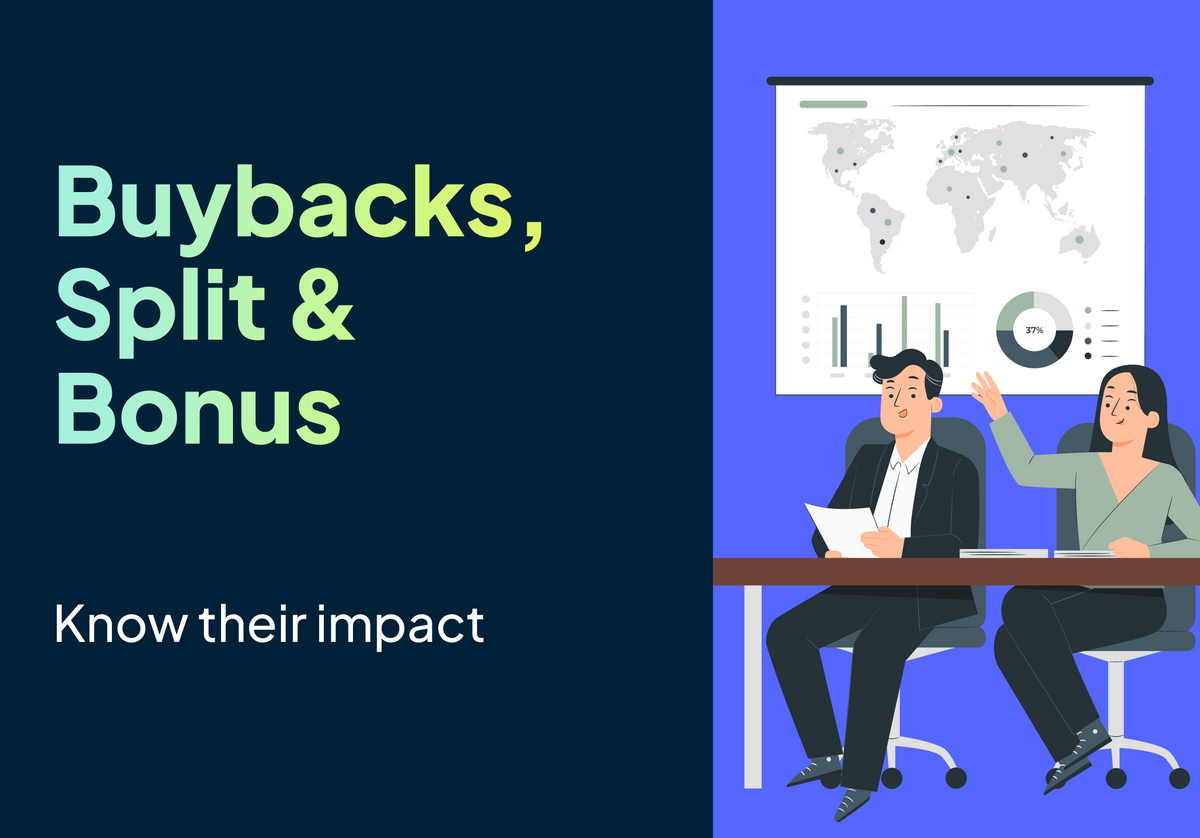What Are Stock Buybacks, Splits, & Bonuses? How Do They Impact Stocks?
Confused about stock market actions like buybacks, splits, and bonuses? Unravel their impact on stock prices and understand how companies utilize them.

With so many stock-related concepts to comprehend, the stock market may be confusing if you are new to the investment scenario. Beginners frequently experience misunderstandings regarding business/corporate actions, such as stock buybacks, splits, and bonuses. These acts can significantly impact the value of a stock, but many individuals are unaware of what they mean or how they operate.
Today, we'll dive deep into these actions and discuss how they might affect the stock price.
What Are Stock Buybacks?

Starting with the first action, which is Stock Buybacks.
When an organisation or a company repurchases its shares from the market, it is called a stock buyback or a stock repurchase. The shares are bought by the company or firm using cash on hand or by taking out a loan, after which they will be taken out of circulation. As a result, fewer shares are outstanding in the market, which may raise the value of each share that is still in circulation.
For example, if a company has 100 outstanding shares and decides to buy back 10 of those shares, there will only be 90 shares available in the market, making each remaining share more valuable.
What Are Stock Splits?

During a stock split, a company or firm will divide its current shares into several new shares. For example, if a company's stock trades at Rs 100 per share and decides to do a 2-for-1 stock split, each shareholder will now have two shares worth Rs 50 each. A 2-for-1 stock split would double the number of outstanding shares while halving the value of each share. The market value of the outstanding shares doesn't change, but the price per share does, and so does the number of shares in circulation.
Since stock splits can lower a stock's price and boost market liquidity, investors frequently view stock splits favourably. Also, when the price of a stock rises too much, companies may decide to split it, which makes it affordable for regular investors to purchase. Splits may also increase trading activity, enhancing the stock's liquidity and helping in price appreciation.
What Are Stock Bonuses?

When a business gives extra shares of stock to its current shareholders, the practice is known as a bonus, commonly referred to as a stock dividend. Typically, an investor receives these bonus shares based on how many shares they currently hold. Usually, the bonus shares are issued at a discount from the current market price.
Here's an example that will help to understand stock bonuses:
Let's say that an AA company offers a stock bonus of 100 shares of company stock to its employees. The company's current stock price is Rs 50 per share, so the value of the given 100-stock bonus would be Rs 5,000 (100 shares x Rs 50 per share).
Now, if the stock prices of this same company rise to Rs 60 per share, the employee's stock bonus value would also increase to Rs 6,000 (100 shares x Rs 60 per share). On the other hand, if the company's stock price decreases to Rs 40 per share, the total amount of the employee's stock bonus would decrease to Rs 4,000 (100 shares x Rs 40 per share). That’s how the profit or loss on stock buybacks are made.
Why Do Companies Perform Stock Buybacks?
It's essential for you to understand that a company's actions in the stock market can significantly impact the value of its shares. For example, a company can buy back its stock and increase the value of each remaining share by reducing the total number of shares available. A shareholder bonus can also be a positive sign for investors, as it can drive demand for the stock and reward shareholders.
That being said, it's crucial to approach these actions cautiously and not assume they always indicate positive things. A stock buyback, for instance, may suggest that a company has an excess of cash or a lack of investment opportunities. Similarly, a shareholder bonus or stock split might be seen as superficial adjustments that overlook fundamental financial issues. As an investor, it's essential to conduct thorough research and analysis before making any investment decisions.
How Do Stock Buybacks Impact the Long-term Price Movement?
The long-term price movement depends on a particular company's stock buybacks or stock splits. Stock buybacks can raise the value of each share still in circulation by lowering the total number of outstanding shares. This may result in higher earnings per share (EPS) and possibly stronger stock demand.
One example of how stock buybacks can impact the long-term price movement of a stock can be stated back to the case of Apple Inc. In 2018, Apple Inc. announced a $100 billion stock buyback program, which was one of the largest in the stock history market. The company planned to buy back its own shares over several years.
After the announcement of its stock buyback program, Apple's stock price began to increase steadily. By the end of 2018, the stock had risen more than 30%. This increase was partly because of the market's positive response to the buyback program, as investors saw it as a sign that Apple was committed to returning value to shareholders.
In the Indian market, if you look at the stock price of MRF, it has never been split, because of which one share of MRF costs more than Rs 1 lakh. On the other hand, IRCTC, ITC, and TCS stocks have been split multiple times, making the stock price accessible for retail investors.
Summary
- Stock Buybacks: When a company repurchases its shares, it reduces the number of outstanding shares, potentially increasing the value of each remaining share.
- Stock Splits: Companies divide their existing shares into multiple new shares, adjusting the price per share and increasing liquidity, making it more accessible to investors.
- Stock Bonuses: Companies provide additional shares to current shareholders, rewarding them based on their existing holdings, which can fluctuate in value as the stock price changes.
- Company Motives: Stock buybacks can signal value to shareholders, while caution is needed as they may indicate a lack of investment opportunities. Stock splits and bonuses can drive demand but may overlook fundamental financial issues.
- Long-Term Impact: The effect of these actions on stock price movement varies. Examples show successful buybacks boosting stock prices, while others result in declines. Thorough research and analysis are crucial before making investment decisions.
Checkout more interesting reads on our blog





